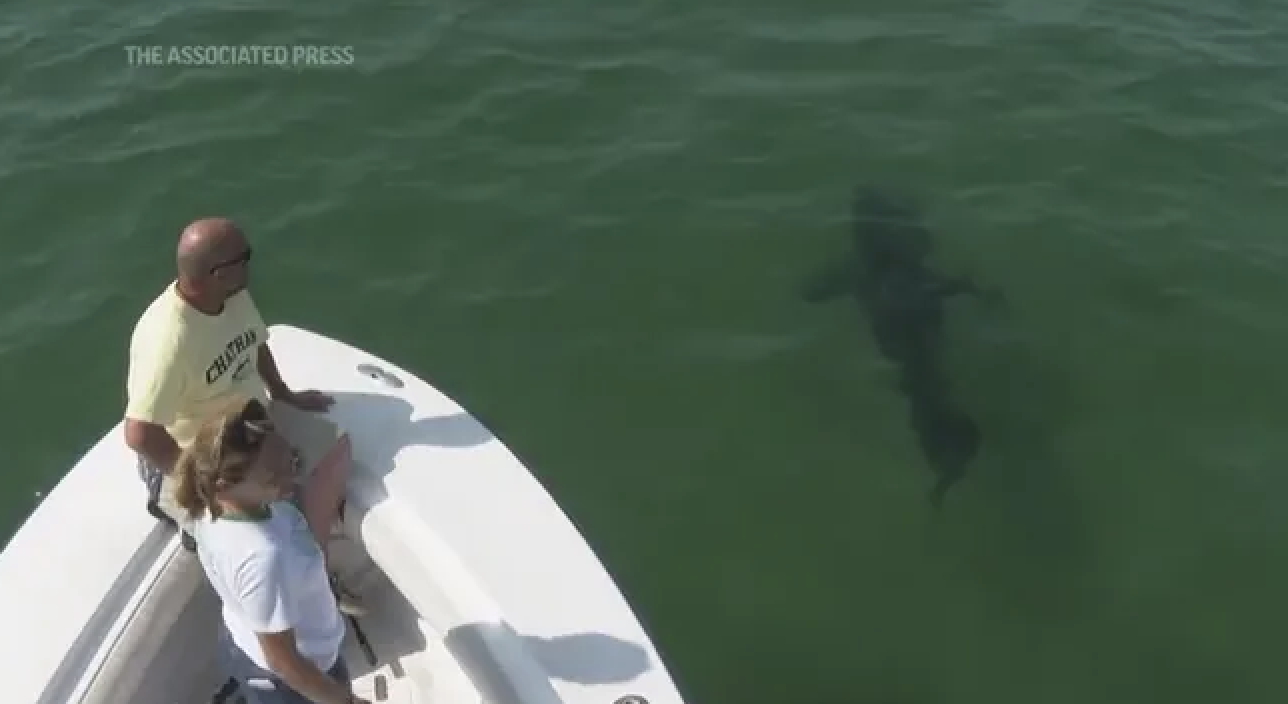A great white shark glides gracefully off the Massachusetts’ coast of Cape Cod, a popular summer tourist destination that is now embracing the presence of the apex marine predators.
Michael Simard crouches on the bow of a shark-sighting boat while his partner, Penny Antonoglou, stands beside him as they watch a great white shark cruising in the glassy water below.
The two-hour shark ecotour was the highlight of their weeklong summer vacation on Cape Cod, a trip that Penny Antonoglou says she has made every year for the past two decades.
“So we saw about six sharks, yes, some of them about eight feet, others longer about, I don’t know …” Antonoglou says.
The biggest shark, Simard says, was estimated to be 12 to 14 feet long.
Penny Antonoglou nods in agreement, adding: “and they would come up towards the surface. That was awesome. The water was crystal clear. There were no waves. It was a very beautiful sunny day. And seeing those animals up close was … was amazing.”
Simard is a 48-year-old construction foreman from Cambridge, Massachusetts, who describes himself as a lifelong shark enthusiast.
He says he has watched great white sharks on popular cable television programs and wanted to see them up close.
That has been impossible in his native Massachusetts, until growing shark population off Cape Cod shores spawned a rising number of charter boat operators offering shark tours in a region where whale and seal watching excursions have long been popular.
He took his first tour in August with his partner, Antonoglou.
How does he describe the experience?
“It was incredible, like, the … to be able to look into the water that clear and see such a … I didn’t realize how graceful they were, really, just cruising along at their own …at their own pace. And they were … They’re quite beautiful,” Simard says.
Their tour was organized and led by Mike Bosley, owner of Dragonfly Sportfishing charters.
“These trips are about introducing people to great white sharks in the wild,” Bosley says.
Bosley developed an interest and learned a lot about great white sharks during the years he used to take researchers out to sea to tag the marine mammals.
He uses the same methods that shark researchers use to find the predators – an overhead “spotter” plane to locate sharks and direct his boat to them.
Like most operations, Bosley’s Dragonfly Sportfishing generally stays hundreds of yards (meters) offshore, in water more than 10 feet (3 meters) deep.
It’s a relatively costly outing, with costs ranging anywhere from $1,500 to $2,500 per boat for the nearly three-hour outing, and the vessels typically carry six passengers at most.
Great white sharks often swim gracefully and leisurely in shallow water very close to Bosley’s boat.
Mindi Moran is a licensed massage therapist living in Portland, Maine, who recently treated herself to a birthday gift of a shark-sighting tour.
She hired Bosley for the adventure, during which she took photos of gray silhouettes of great white sharks gliding by the boat and watched the captain restricting time spent with the marine predators to minimize stress on the animals.
“And to know that they’re protected, and our captain is really respectful of their space and not putting a lot of pressure on them made me feel really good too, you know, and I think that’s important. If someone comes, and they want to experience that, just have a healthy respect for them,” Moran says.
Finding sharks off the coast of Cape Cod is not hard, with the marine predators sometimes showing up where boaters least expect them.
Cape Cod’s slow embrace of its shark reputation comes three summers after the popular vacation destination saw its first great white shark attacks in generations.
The shark tourism economy represents a delicate balance for the peninsular.
Indeed, dozens of beaches have temporarily closed in recent weeks after sharks were spotted as close as 30 feet (9 meters) from some of the Cape’s most famous stretches of sand.
Shark researchers say they expect to be out tagging and observing the predators into November, if the weather permits.
Beachgoers at Cape Cod’s popular Lighthouse Beach – a large sandy destination known for strong currents, a working lighthouse and the presence of a seal population, a key source for food for area great white sharks – appeared unfazed by the fact that powerful marine predators where lurking underwater.
Not so for Simard, who was in a reflective mood after seeing great white sharks a few hundred yards offshore, with the low tide effectively keeping them further from beaches full of swimmers.
“It does put in perspective that this is their element, and we share it with them,” Simard says.
The coastline of Cape Cod’s popular destination of Chatham is dotted with fishing, tour and pleasure boats, quaint cottages and fancy mansions in the background and the sound of seagulls providing the soundtrack.
“Obviously, Cape Cod is beautiful in itself, but with the sharks, you know, increasing and coming up here every summer, I think that does, you know, make it more of a tourist attraction,” Moran says after a memorable shark-sighting tour.
When beachgoers, boaters and pleasure pilots began reporting sightings of great white sharks off Cape Cod beaches a few years ago, business owners and the local chamber of commerce feared that would spell disaster for the tourism-dependent economy.
Businesses dreaded the negative perception seared into the public imagination by “Jaws,” the 1975 blockbuster movie about a man-eating great white shark that made its director, Stephen Spielberg, a household name.
Paul Niedzwiecki is the chief executive officer of the Cape Cod Chamber of Commerce, a nonprofit organization that promotes tourism and other business interests on Cape Cod.
“When we started to see (great) white sharks become more prevalent several years ago, there was a concern that it might have a negative impact on tourism. But we’ve been working to educate people about sharks and having them be shark smart,” Niedzwiecki says.
The shark smart campaign includes warning for beachgoers not to swim with seals, a key food source of great white sharks.
Back at Cape Cod’s popular Lighthouse Beach, beachgoers happily go about their leisurely activities, including basking in the summer sunshine, walking on the beach, gossiping, rubbing sunscreen lotion on each others’ backs and even cooling off in shallow water.
There’s no definitive tally for how much shark-related tourism contributes to the 70-mile (112-kilometer) peninsula’s economy, but the head of the local chamber of commerce says the marine mammals have been a surprising blessing to the tourism industry.
“The tourism season on the Cape starts at Memorial Day and pretty much ends at Labor Day, with an increase right after the Fourth of July when it really kicks off. And the peak season is really the last two weeks in July and the first two weeks of August. So for the Cape economy, it’s always been important to extend that season as much as possible into the shoulder seasons. So beyond Labor Day,” Niedzwiecki said.
On Chatham’s main street, a steady stream of customers flock into the Cape Shark Apparel store, a company that started selling popular stickers of Cape Cod in the shape of a great white shark some seven years ago and which has taken off as the local shark population has also come into its own.
Cape Shark Apparel cofounder Kristina Manter is on the checkout counter, folding and packing products for customers at her shark-themed store.
Niedzwiecki, of the Cape Cod Chamber of Commerce, says Cape Shark Apparel is an example of the benefits that great white sharks are having on the local economy as various businesses tap on public fascination with the formidable marine predator.
The Atlantic White Shark Conservancy recently reopened its Shark Center in Chatham after extensive renovations.
The nonprofit shark advocacy group is also developing another waterfront outpost to offer its own shark tours and interactive exhibits of its research on the local great white population.
There are currently no licensing or registration requirements for the tours, but those and other regulations should be on the table if more join the fray.
The state has already banned the use of bloody fish chum and decoys to lure sharks in recent years, meaning the kinds of shark cage diving operations that are common in Florida, Hawaii and elsewhere aren’t allowed in Massachusetts waters, unless they’re more than 3 miles (5 kilometers) offshore.
A great white shark swimming near a boat carrying curious tourists is blissfully unaware of its impact on the economy.
Tourist Michael Simard is enthusiastic over his encounters with the marine mammal.
“This exceeded all expectations for me. I was hoping to at least see one, to see six and just, like, constantly with Mike in contact with his pilot, Norman (St. Pierre), and we just cruised up and down the shore at one shark to the next exceeded expectations. It was great. It was everything I’d hoped it could be and more,” Simard says.
The frequent sightings of the telltale gray silhouette of a great white shark – together with sights of boaters cautiously leaning over the boat to look at the gliding underwater figure – often indicates to nearby pleasure boaters to come closer to look at the latest Cape Cod tourist attraction.
For Mike Bosley, the shark-sighting tour boat operator, the vision of the marine mammals is always inspiring.
“That’s a big fish,” Bosley says as one great white shark glides effortlessly near his boat.







